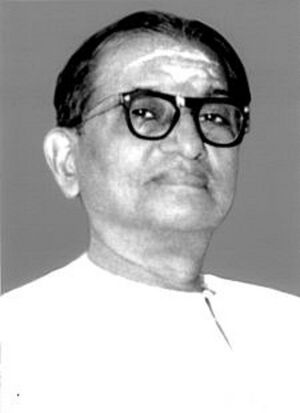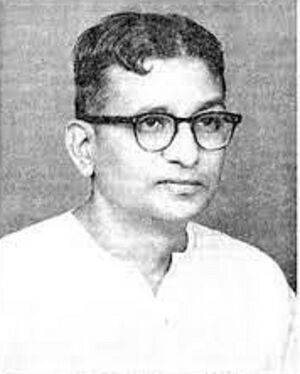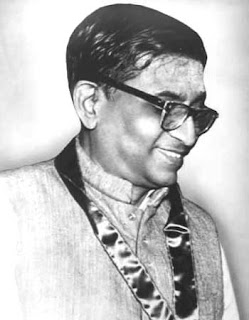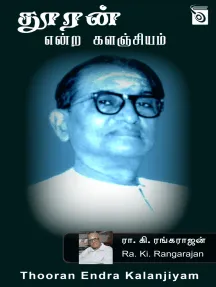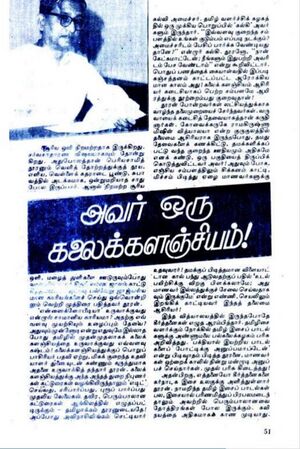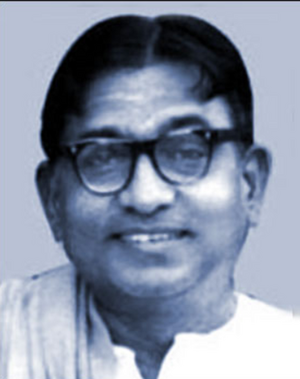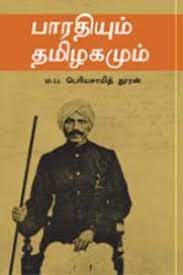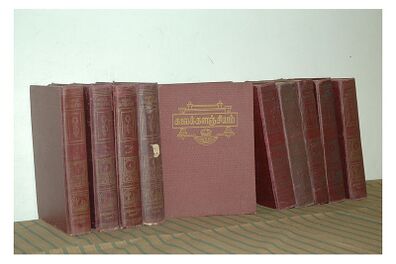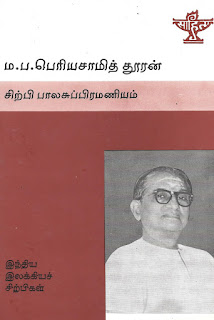Periyasamy Thooran
இந்தப் பக்கத்தை தமிழில் வாசிக்க: பெரியசாமி தூரன்
Periyasamy Thooran (also known as M.P. Periyasaamy Thooran, Periyasami Thooran) (September 26, 1908 - June 20, 1987) was a Tamil scholar. He compiled the first modern Tamil encyclopedia. A traditional poet, translator, publisher, lyricist and composer of children's songs, he was one of the earliest scholars to study Subramania Bharathi's life and works. Owing to his contributions as principal editor of both the first modern Tamil encyclopedia and the first children's encyclopedia in Tamil, he is regarded as one of the chief architects of the modern Tamil intellectual movement.
Birth and Education
Periyasamy Thooran was born in Manjakkatuvalasu, a village near Modakurichi in Erode district, on September 26, 1908 to Pazhanivelappa Goundar and Pavaathaal. At birth, he was named Manjakkattuvalasu Pazhaniyappa Goundar Periyasamy. His surname 'Thooran' refers to a subcaste (or koottam) within the Kongu Goundar caste. Thooran's mother died when he was young.
He attended primary school in Modakurichi, his hometown. Influenced by Thirumalaisamy Ayyangar, a teacher in his school, he got interested in Tamil language and literature. He was a member of the Karungalpalayam library in Erode, he read extensively in his school days. He completed high school at the Mahajanasabha High School in Erode. In 1927, he completed his intermediate degree from Presidency College, Chennai, and in 1929, he obtained an L.T. (Licentiate in Teaching) in mathematics.
He enrolled for an undergraduate degree in 1930. However, in 1931, when the heroes of the freedom struggle, Bhagat Singh, Sukhdev and Rajguru were hung to death, Periyasamy Thooran boycotted his final degree exams to participate in the protests against this event. Thooran never completed his degree till the end.
Personal Life
Thooran married Kaliyammal on May 1, 1939. He had three daughters, Saradamani, Vasantha and Vijayalakshmi, and a son, Sudhanthira Kumar. Sudhanthira Kumar's wife was Shenbagatilakam.
From 1929, Thooran was employed as a schoolteacher. From 1948-1968 he served as the principal editor of the Tamil encyclopedia and from 1968 - 1976, the principal editor of the children's encyclopedia. He retired in 1976, after which he became a full-time writer. He lived and died in Coimbatore.
Educational Service
Thooran began his life as a school teacher. From 1929, he worked as a teacher in Diamond Jubilee High School, Gobichettipalayam. In 1931, after he had dropped out of undergraduate studies, he started work as a teacher at the Pothanur and Periyanayakkan Palayam branches of the Ramakrishna High School. This was a chain of school founded on Gandhian educational ideals by Thi.Su.Avinasilingam Chettiar. Chettiar mentions in his diaries that during the time Thooran worked there, he accepted only a very small amount of money as salary and lived frugally like an ascetic, owing to his principled belief that educational institutions ought to be run at low cost. In 1934, when Gandhi visited Coimbatore to collect money for the Harijan Fund, he gave a speech at Ramakrishna High School. During this visit, Periyasamy Thooran made the welcome address felicitating Gandhi and translated Gandhi's speech for the public. He worked at the Ramakrishna schools till 1948.
Politics
Periyasamy Thooran dropped out of school to participate in the protests organized by the youth wing of the Congress Party. He was involved in the village self-governance movements of the Congress. While working as a teacher, too, he volunteered in the villages near Gobichettipalayam and Pothanur to improve the lives of the people there. He was involved in the propagation of the idea of Khadi along with Kovai Iyamuthu and others. A close associate of Thi.Su.Avinasilingam Chettiar, Thooran supported the Congress till the end of his days.
Spirituality
Periyasamy Thooran hailed from a family of Murugan devotees. He was particularly attached to the form of the deity enshrined at the Sennimalai temple. He was a composer and lyricist, and has composed many remarkable devotional songs on Murugan, including the famous "Muruga muruga endral urugadho undhan ullam."(Link) In his last days, Periyasamy Thooran was drawn to Yogi Ramsurat Kumar and composed devotional songs about him.
Journalism
When Periyasamy Thooran was a B.A. student at the Presidency College, Chennai, along with friends such as C. Subramaniam, Ne.Thu.Sundaravadivelu, O.V.Alakesan, Ila.Ki.Muthusamy, K.M.Ramasamy, K.S.Periyasamy, K.S.Pazhanisamy and others, he organized a forum called Vanamalar Sangam (Wildflower Collective). They brought out a literary magazine called Pithan. The magazine was printed at the Sadhu printing press run by Tamil scholar and poet Thiru.V.Kalyanasundara Mudaliyar.
Later he brought out a popular magazine called Kalachakkaram in the mould of Time magazine, sponsored by P. Nachimuthu Goundar (father of industrialist Pollachi N. Mahalingam). He ran this magazine along with the poet Ve.Ra.Deivasigamani Goundar. He published various poetic works in the magazine, including Kalamega Pulavar's Chittiramadal, the text of Vadivel Pillai's opera Mohinivilasam, Avinasi Pulavar's Thingalur Nondi Nadagam and Saminadha Kavinjar's Kondraivendhan Venba.
Roles and Responsibilities
A list of responsibilities that Periyasamy Thooran held
- Secretary, Tamil Nadu Development Board
- Secretary, Children's Writers Association
- President, Tamil Writers Association
- Coordinator of a committee researching ancient Tamil musical scales called Pann.
Literary Life
Periyasamy Thooran got into literature through the influence of Thiru.V.Kalyanasundara Mudaliyar. He was a keen student of the emerging nationalistic Indian literature in his youth. He could read with equal felicity in both English and Hindi, and thus familiarised himself with both European literature and Indian literature. Thooran's literary contribution spans a wide range of intellectual activities: traditional Tamil poetic compositions, free verse, short stories, plays, children's literature, studies on the poet Bharathi, introductory texts on various subjects and translations.
Traditional poetic compositions (Marabukavidhai)
Periyasamy Thooran was primarily interested in the traditional Tamil poetic form, marabukavidhai, that had gained new life in the 20th century. C. Subramania Bharathi, Bharathidasan and Kavimani Desigavinayagam Pillai were his forerunners in this endeavour; Namakkal Kavignar Ve. Ramalinga Pillai was his contemporary. These poems preserved the meter and rhyme scheme of the traditional marabukavidhai seyyul verses, but the language, contrary to the archaic style of the old poems, was fresh and contemporary and closer to spoken Tamil. These poems were composed in relatively simple meters like asiriyappa, sindhu etc.
Thooran's poems were first published as volumes titled Ilanthamizha, Minnal poo, Nilaa pinju and Patti paravaigal. Later they were compiled into a single anthology, Thooran kavidhaigal. It was brought out by the publishing house Pari Nilayam. Thooran employed many forms in his poetry. There are poems like Kaivalam which are structured like folk songs, verse poems telling a ballad-like story like Veeran Kumaran, Kizhaviyum Ranavum, Prithvi Raj - Samyukthai, epistolary poems like Kadhalikku kaditham, Badhil, Kadidham and poems structured like dialogue, like Odakkaran, in his anthology.
Free verse (Vasanakavidhai)
Thooran wrote vasanakavidhai or free verse poems in Bharathi's style. Volumes of these poems include Irulum oliyum, Arivaai nee, Mele para, Manida ezhuga, Yaradhu, Vazhkai payanam, Sandhippu, Namadhu vazhi etc. Thooran was not associated with the New Poetry movement emerging from Si.Su.Chellappa's little magazine Ezhuthu.
Children's literature
Most of Thooran's books were stories and songs aimed at children. He wrote 16 children's books in all. Six of these were collections of stories, five novels, two works of science fiction and three were poetry collections. These books were all published by Palaniappa Brothers, Chennai.
Thooran composed songs for children, keeping the age of the child in mind. He has nursery rhyme like songs for very young children and written fiction aimed at older kids. Aanaiyum poonaiyum', 'Nalla nalla paatu', 'Mazhalai amudham are some of his songs for children made popular through the radio. Olaikkili, Thambiyin thiramai, Nattiyarani, Manjal Muttai and Nilappatti are some of his popular children's stories. He wrote widely read and much beloved tales of adventure and daring sprinkled with scientific trivia for older children. Some of the popular titles in this genre included Mayakkallan, Soora Puli, Kollimalai Kallan, Sangagiri Kottai Marmam, Tharangampadi Thangapudhaiyal etc.
Pedagogy
Thooran wrote many books for children introducing complex scientific concepts in simple language. His Children's Encyclopedia is still considered a fundamental text in Tamil academic circles. Thooran wrote various books on child psychology aimed at parents and teachers - Manamum adhan vilakkamum, Karuvil valarum kuzhandhai, Parambariyam, Adimanam, Petror kodutha perungkodai, Kuzhandhai manamum athan malarchiyum - being some.
These books, which were published at the same time that elementary school education became widespread in Tamil Nadu, created a fundamental and deep impact on Tamil society. In traditional schools and hereditary educational models, teaching was always accompanied by harsh punishments. They were educational models that believed in dragging the child forcefully into the world of adults. Thooran proposed that instead, the teacher and parent ought to enter the world of the child while teaching them. His works on pedagogy were widely read in the teacher training centres of Tamil Nadu.
Translations
Thooran was an excellent translator. He translated all the English articles for his encyclopedia into Tamil himself. His translated works include Ravindirar Kuzhandhai Ilakkiyam (1903) and Jamal Ara's Paravaigalai Paar (1970). He translated Jack London's novel The Call of the Wild into Tamil, titled Kaanagathin Kural. This book left a lasting impact on the modern Tamil literary scene.
Plays
Thooran wrote the following plays: Azhagu Mayakkam (1955), Soozhchi (1955), Ponnachiyin Thyagam (1955), Aadhi Athi (1958), Kadhalum Kadamaiyum (1957), Manakugai (1960), Ilanthuravi (1961). In the forewords to these plays, he has written extensively about his ideas on dramatics.
The story of the star-crossed lovers Adhimanthi and Attanathi from the Sangam age was adapted into a play called Cherathandavam by Bharathidasan, an epic called Attanathi Adhimanthi by Kannadasan, and a play called Kalangarai deivam by Dronan. Thooran adapted the same tale into a play called Adhi Athi. The love triangle of Athi, Adhi, and Marudhi is laid out in this play.
"Thooran's plays are full of patriotism, the ideals of pure love and the sacrifice of women. His plays can be characterised by psychological conflicts and the play of the unconscious in the drama," wrote Sirpi Balasubramaniam in his biography of Thooran.
Introductory texts on various topics
Thooran believed that science should become a subject of common intellectual discourse in Tamil. "The scientists of our land who have made significant discoveries seldom write about their research in their mother tongues. So the majority of people who don't know English know nothing about this," he wrote in an article. He published books on popular science aimed at school students written in simple Tamil. These served as models for later writers of popular science books. These books, written at a time when scientific literacy was just becoming common in Indian education later guided the drafting of science textbooks for schoolchildren.
All seven of Thooran's elementary science books were published in the 1960s. His books including Parambariyam (1956), Aramanam (1957), Kumaraparuvam (1962), Manamum adhan vilakkamum (1960) and Kuzhandhai manamum adhan malarchiyum (1953) were psychology books meant for children. He listed a few key scientific terms in the glossary of his book Karuvil valarum kuzhandhai (1962). He had coined these words himself - one of Thooran's most significant contributions to science writing in Tamil. For example, he coined words like andam (ovary), nirakkol (chromosome), karuthadai (placenta), pooritha andam (fertilised egg) etc. From this book, these words made their way into textbooks and eventually became part of common Tamil vocabulary.
Short stories
Periyasamy Thooran published short story collections titled Pillaivaram, Thanga Changili, Urimai Penn, Kalingarayan Kodai, and Maavilakku. However his short stories did not achieve the form, tone and grammar of the modern short story. His stories were simple, direct stories written in service of his ideas. They were comparable to the stories written by C. Rajagopalachari during this period.
Bharathi Studies
A serious course of research into the life and works of the poet C. Subramania Bharathi began in the 1950s and went on to become a complex intellectual movement in its own right. The research was carried out in many stages across a long period of time, by many different scholars. Periyasamy Thooran belonged to the first generation of Bharathi scholars. He compiled Bharathi's poems that had been published in various journals and magazines, cross-referenced various versions of the same poems, edited them, made a chronology of the poet's works and communicated his findings with other scholars. Thooran was forerunner to three generations of Bharathi scholars, including Ra.A.Padmanabhan, Seeni Viswanathan, Ilasai Maniyan, A.Ra.Venkatachalapathi, Ya. Maniyan, Kadarkarai Mattavilasa Angadam etc.
Periyasamy Thooran wrote 11 books about Bharathi. His compilation of Bharathi's works written in 1930 titled Bharathitamizh was published in 1953. For the first time, Thooran compiled all of Bharathi's works under 134 headings. Criticisms on Bharathi, his songs, and other books were published by Vanathi Pathippagam between 1979 and 1982. In 1935 when the ban on Bharathi's songs were lifted, the press Bharathi Prasuralayam released a volume of his compositions. Many songs in that compilation had already been identified by Thooran. However, since Thooran had not published his volume at that time, his contributions went unnoticed, opines scholar A.K.Perumal.
Tamil Isai Movement
Thooran was one of the prominent faces of the Tamil Isai Movement. Thooran writes that he developed an interest in Carnatic music through the influence of his paternal uncle Arunachala Goundar. Another Arunachala Goundar, a relative, was a music teacher. Thooran's compositions are still popular in stage concerts. Thooran started learning music in 1931 when he was a teacher in Pothanur. He trained under N. Sivaramakrishna Iyer, and later in Chennai under P.K.Govinda Rao.
The first collection of his compositions was bought out by Alliance Publications under the title Isaimani Maalai. In 1951, another volume Tamizhisai Sangam Keerthana Manjari was published. In 1958, Annamalai University brought out a compilation of Tamil songs called Tamizh isai paadalgal in two volumes. With the financial support offered by the Tamil Nadu Iyal Isai Nadaga Mandram and Tamizhisai Sangam, Thooran brought out a series of books of his compositions, including Isaimani Manjari (1970), Murugan Arulmani Maalai (1972), Keerthanai Amudham (1974) and distributed them freely to classical music performers. The volume Navamani Isai Maalai was published in 1980 by Tamil Nadu Iyal Isai Nadaga Mandram.
His lyrics were set to tune by T.K.Govinda Rao, a student of Musiri Subramaniya Iyer and Dandapani Desikar. Thooran's compositions were appreciated by stalwart musicians like Tiger Varadachariyar, Subramaniya Iyer, Semmangudi Srinivasa Iyer and others. They sang his songs in concerts and popularised them. In 1972, the Tamil Isai Sangam conferred the title of Isaiperarignar on Thooran.
Although Periyasamy Thooran can be considered one of the giants of modern Tamil intelligentsia, his contributions to other spheres are largely forgotten. However he is still remembered on the concert stage. His compositions are very often sung in classical music concerts.
Some popular songs
- Muruga muruga endral urugadho undhan ullam
- Azhagu deivamaga vandhu pazhani malai meedhil nirpom
- Konji konji vaa guhane
- Punniyam oru kodi
- Kaliyuga varadhan
- Pachai kuzhandhai paruvathe
- Enge thedugindrai
- Engu naan selvenaiyya
- Thaye tripurasundari
- Muralidhara gopala
- Appa unnai maravene
Encyclopedia
Thi.Su.Avinasilingam Chettiar of the Congress Party, who was education minister, created an independent body called Thamizh valarchi kazhagam for the development of the Tamil language. As part of this body's activities, a plan was drafted to create an encyclopedia of terms in Tamil. It was decided that the encyclopedia would be compiled and released as a multi-volume collection. Thooran was selected to serve as the principal editor of this encyclopedia. Thooran toiled for nineteen years and brought out the encyclopedia. The task, begun in 1948, was completed in 1968.
Following this, he worked on a Children's Encyclopedia in 1976. His work on these encyclopedias were a monumental achievement. Thooran's encyclopedia was the first in the history of modern Tamil literature, and thus an origin point of an intellectual movement in modern Tamil.
(See: Tamil Encyclopedia)
Final Days, Death
Thooran suffered a paralytic stroke in 1980. As a result of the changes in the political landscape of Tamil Nadu, Thooran, a supporter of the Congress party, was sidelined by the government and the universities in his last days. He only had the support of the industrialist Pollachi Na. Mahalingam.
Thooran died on January 20, 1987.
Memoirs, Biographies, Research
Periyasamy Thooran is one of the very few personalities who can be identified as the principal architects of the modern Tamil intellectual movement. A genius of Thooran's stature was not accorded due recognition due to political reasons. No monuments or other memorial structures were created in his memory in his hometown Erode, or in Coimbatore where he spent most of his life, or in the capital city of Chennai.
- Bharathiya Vidya Bhavan, Coimbatore brought out an anthology about Thooran. This anthology was edited by Sirpi Balasubramaniam and co-edited by professor Rama Rusuppillai and Dr. I.K.Subramaniyam. The foreword was written by Pollachi Na. Mahalingam.
- Sirpi Balasubramaniam wrote the book M.P.Periyasamy Thooran as part of his Indhiya Ilakkiya Sirpigal series.
- Ra. Ki. Rangarajan wrote a book called Thooran endra kalanjiyam (with foreword by Kalki)
- The Tamil Wiki Internet Encyclopedia instituted the Tamil Wiki Thooran Award in 2022. This award recognizes significant contributions to the fields of literature and culture.
Awards
- Padma Bhushan (1968)
- Kalaimamani Award, Tamil Nadu Iyal Isai Nadaga Mandram (1970)
- Isai Perarignar Award, Tamil Isai Sangam (1972)
- Annamalai Chettiar Award, M.A.C. Memorial Trust (1978)
References
- அ.கா பெருமாள்: தமிழறிஞர்கள் புத்தகம்
- பெரியசாமி தூரன்: தமிழகத்தின் உண்மையான பெரியார் - தமிழ்ஹிந்து
- 'செந்தமிழ்ச் செல்வர்’ ம.ப.பெ. தூரன்!
- https://www.jeyamohan.in/725/
- பேராசிரியர் பசுபதி பக்கம்
- https://youtu.be/DOyBEAduQHg
- முருகா முருகா என்றால்...பதிவு
- பெரியசாமி தூரன் | எழுத்தாளர் ஜெயமோகன் (jeyamohan.in)
- தூரன் எழுத்தோவியங்கள் இணையநூலகம்
- பெரியசாமித் தூரன் கீர்த்தனை அமுதம் இணையநூலகம்
- தூரனின் இசை தமிழ் இந்து
- பெரியசாமி தூரன் தமிழ் ஆன்லைன் தெ மதுசூதனன்
- தூரன் - கீற்று கட்டுரை- பி தயாளன்
- தூரன் பணிகள் புலவர் செ.இராசு
- தூரன் இசை பற்றி...
- https://mediyaan.com/periyasaamy-thooran/
- தூரன் - விக்ரமன் கட்டுரை
- தமிழிசைப் பாடல்கள் பெ.தூரன் இணையநூலகம்
- https://sites.google.com/site/periasamythooran/Home/Keerthanas-mp3 தூரன் இசைப்பாடல்கள் இணைப்பு
✅Finalised Page
